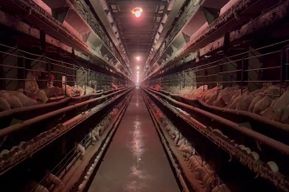
We have 30 days to take on Goliath – again
November 12, 2025
September 18, 2020
Over the last 2 days, the Sejm (the lower house of the Polish Parliament) has held a historic meeting for the legal protection of animals in Poland. It concerned the so-called "Five for animals": a proposed bill with certain key changes to animal protection law. MPs voted in favour of an amendment, which includes, among other things, a ban on breeding animals for fur.
Yesterday's sitting of Sejm was concluded by a vast majority voting in favour of the Five for Animals. This means that today is a very important day for everyone concerned with animal welfare. The victory is even greater when you consider the fact that Poland is the third biggest fur producer in the world. Every year, over 5 million animals are killed for fur in Poland, but hopefully, this cruelty will now finally come to an end.

Five for Animals is a bill initiated by Jarosław Kaczyński (the leader of the ruling party) and the Young Law and Justice Forum. This draft concerns the improvement of animal welfare law, through measures that include, among other things, a ban on fur farming, the strengthening of controls on the living conditions of animals, a ban on the use of animals for entertainment (e.g. in circuses), a ban on keeping animals permanently on chains, the definition of minimum pen dimensions and a restriction on the possibility of ritual slaughter (the way of killing of animals according to special guidelines, including the lack of stunning before the slaughter). The bill was submitted to the Sejm on Friday, 11 September 2020.
Work on the amendment had already begun at the Sejm the following week. The discussions on the Five for Animals project started on Wednesday evening and ended on Thursday night. The changes have since gained cross-party support.
The project's sponsor was the Law and Justice Party MP Grzegorz Puda, Deputy Minister of Funds and Regional Policy. He defended the project against attacks by supporters of the fur industry. In addition to the key issue of ethics, he argued that the project had involved consultations with villagers who suffer from the stench, insect infestations, environmental and groundwater pollution as a result of fur production, and who, as farmers, support the ban.

It is a huge victory for everyone involved in the campaign. Otwarte Klatki started the fur ban campaign (called “Cena Futra” - price of fur) 9 years ago. Since then, they have exposed the reality of the Polish fur industry. Their activists participated in countless demonstrations, fundraising events, talks with companies and politicians, discussions and evidence gathering from people living next to fur farms, and much more.
Investigations have always been a crucial part of this work. And the last one that we published, featuring what is probably the biggest mink farm in the world made fur farming once again a topic of political discussion. The footage recorded by Yevhen revealed numerous cases of cannibalism, aggression, self-harming, open wounds and paralysis amongst minks on the farm. Also, it showed the lack of veterinary care on the farm and many cases of animals escaping. Just two hours after the publication of this footage there was the press conference organised by the ruling party, in which they announced the “Five for Animals” bill. Many amazing things happened since then - politicians from across the political spectrum supported the initiative and it all resulted in a majority of MPs (77%) voting in favour of it.
Now the bill has to be voted by the Senate (the upper house of Polish parliament) and signed by the president.
Marta Mikita is engaged in movement building and maintaining contact with people from other organizations. Having been in animal advocacy for years, Marta worked and volunteered for various NGOs in Poland. She is also a co-founder of Vegan Workout - the biggest Polish website about plant-based diets in sports and sports among people on plant-based diets.
